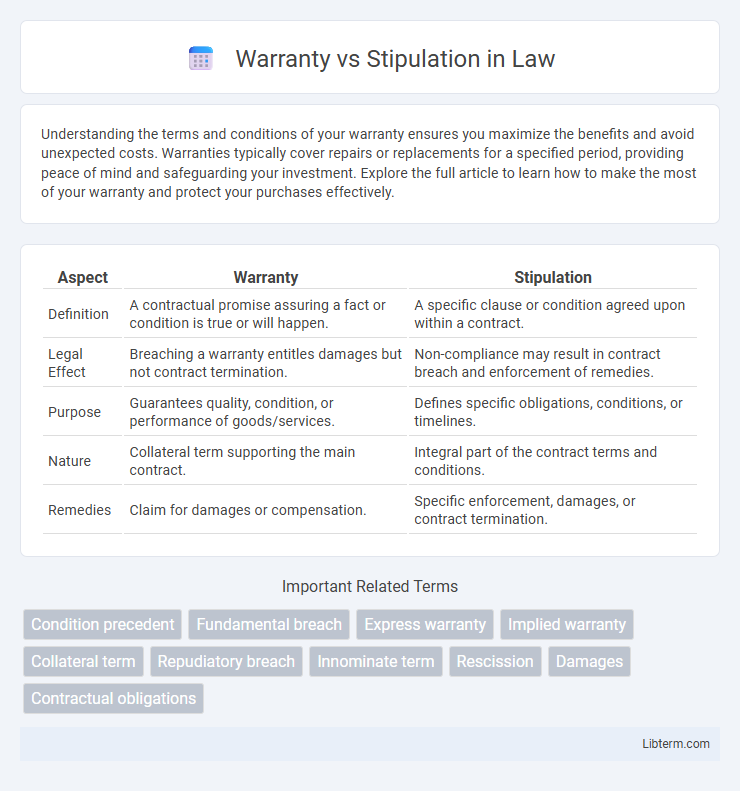Understanding the terms and conditions of your warranty ensures you maximize the benefits and avoid unexpected costs. Warranties typically cover repairs or replacements for a specified period, providing peace of mind and safeguarding your investment. Explore the full article to learn how to make the most of your warranty and protect your purchases effectively.
Table of Comparison
| Aspect | Warranty | Stipulation |
|---|---|---|
| Definition | A contractual promise assuring a fact or condition is true or will happen. | A specific clause or condition agreed upon within a contract. |
| Legal Effect | Breaching a warranty entitles damages but not contract termination. | Non-compliance may result in contract breach and enforcement of remedies. |
| Purpose | Guarantees quality, condition, or performance of goods/services. | Defines specific obligations, conditions, or timelines. |
| Nature | Collateral term supporting the main contract. | Integral part of the contract terms and conditions. |
| Remedies | Claim for damages or compensation. | Specific enforcement, damages, or contract termination. |
Understanding Warranty and Stipulation
A warranty is a legally binding assurance in a contract guaranteeing that certain facts or conditions are true, offering protection and remedies if breached. A stipulation refers to specific terms or conditions agreed upon by parties within an agreement, outlining obligations without necessarily providing guarantees. Understanding the distinction helps clarify responsibilities and the scope of legal consequences in contractual relationships.
Legal Definitions: Warranty vs Stipulation
Warranty is a legally binding promise assuring the quality or performance of a product or service, providing the buyer with grounds for a claim if breached. Stipulation in a legal context refers to a specific condition or requirement agreed upon by parties within a contract, often serving as a prerequisite for certain actions or outcomes. The main difference lies in warranty offering protection against defects, while stipulation sets explicit terms or conditions that must be met for contractual obligations to be fulfilled.
Key Differences Between Warranty and Stipulation
Warranty refers to a contractual assurance guaranteeing the quality or performance of a product or service, while a stipulation is a specific condition or requirement set within an agreement. Warranties create a legal obligation for the guarantor to remedy defects or breaches, whereas stipulations merely outline terms parties agree to fulfill without implying compensation for failure. The key difference lies in enforceability and remedy: warranty breaches often lead to damages or repairs, whereas stipulation violations may result in contractual renegotiation without automatic liability.
Role of Warranty in Contracts
Warranty in contracts serves as a binding assurance that certain facts or conditions are true, ensuring the reliability and quality of the subject matter involved. It provides the injured party with the right to claim damages if the warranty is breached, without necessarily voiding the entire contract. This role distinguishes warranties from stipulations, which are specific contractual provisions or requirements that must be fulfilled to uphold the agreement's terms.
Role of Stipulation in Agreements
Stipulation in agreements functions as a specific, agreed-upon condition that outlines precise duties or restrictions for parties involved, ensuring clarity and enforceability within contractual obligations. Unlike warranties, which guarantee certain facts or conditions about the subject matter, stipulations define explicit terms that parties must adhere to, providing a framework for performance and compliance. These detailed provisions help mitigate disputes by setting clear expectations and consequences in legal contracts.
Importance of Warranty in Purchases
Warranty provides essential assurance to buyers by legally guaranteeing that a product will meet specified quality and performance standards, which protects consumers from defects and malfunctions. Unlike stipulations that outline contractual conditions, warranties offer a clear, enforceable promise that can be claimed if the product fails within a specified period, thus reducing purchase risk. The presence of a warranty significantly enhances buyer confidence and reinforces trust in the transaction, making it a critical factor in consumer decision-making.
Types of Stipulations in Legal Documents
Stipulations in legal documents commonly include types such as conditions precedent, which trigger contractual obligations only when specific events occur, and conditions subsequent, which terminate obligations upon certain events. Affirmative stipulations require parties to perform particular acts or ensure certain facts, while negative stipulations prohibit specific actions to protect parties' interests. Distinguishing these from warranties, which are guarantees of fact or promise, highlights the functional role of stipulations in defining, modifying, or limiting contractual duties.
Consequences of Breaching Warranty vs Stipulation
Breaching a warranty typically results in a claim for damages without voiding the contract, allowing the aggrieved party to seek monetary compensation for any loss incurred. In contrast, breaching a stipulation can lead to more severe consequences, including contract termination or specific performance enforcement, as stipulations often embody essential contractual obligations. The distinction in consequences underscores the importance of accurately categorizing contractual terms to determine remedies and enforceability in cases of non-compliance.
Real-World Examples: Warranty and Stipulation
A warranty in real estate ensures the buyer that the property is free from defects, such as a seller guaranteeing the roof's condition for five years. Stipulation involves specific conditions agreed upon in a contract, like a buyer and seller agreeing that the sale depends on a successful home inspection. Cases like a buyer suing for undisclosed water damage highlight warranties, while disputes over repair deadlines often center on stipulations.
Choosing Between Warranty and Stipulation in Contracts
Choosing between warranty and stipulation in contracts hinges on the level of enforceability and the nature of obligations involved. Warranties offer assurances on specific facts or conditions, providing remedies only if breached, whereas stipulations lay down binding conditions that, if unmet, can result in contract termination or damages. Understanding the legal implications and the contract's purpose ensures appropriate selection, mitigating disputes and safeguarding interests effectively.
Warranty Infographic

 libterm.com
libterm.com